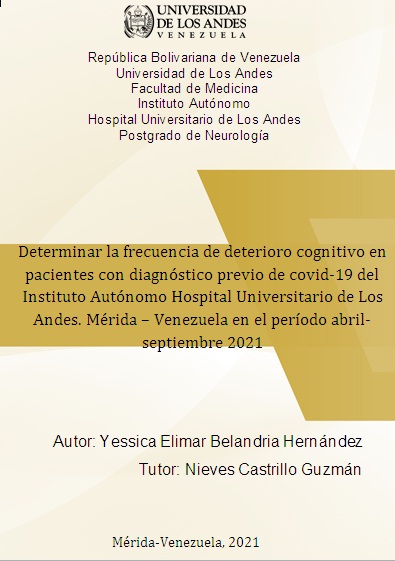Determinar la frecuencia de deterioro cognitivo en pacientes con diagnóstico preventivo de COVID-19 del Instituto Autónomo Hospital Universitario de los Andes Mérida-Venezuela en el período abril-septiembre 2021
Fecha
2021-11-08Autor
Belandria Hernández, Yessica Elimar
Metadatos
Mostrar el registro completo del ítemResumen
Desde inicios de la pandemia por COVID-19, son muchas las manifestaciones neurológicas y extra neurológicas vistas, principalmente de manera aguda; sin embargo, sobre las complicaciones crónicas hay poco descrito debido a la temporalidad reducida desde su aparición; dentro de las mismas se describe el deterioro cognitivo, el cual parece generar un impacto social, afectando la calidad de vida de las personas y teniendo repercusiones socioeconómicas importantes. Objetivo: Determinar la frecuencia de deterioro cognitivo en pacientes con diagnóstico previo de COVID-19, del Instituto Autónomo Hospital Universitario de los Andes, mediante test de MoCA y MMSE, en el lapso de abril a septiembre del año 2021. Método: Es por ello que se realiza un estudio de tipo observacional descriptivo, correlacional de corte transversal; para determinar la frecuencia de deterioro cognitivo mediante los test de MMSE y MoCA. Resultados: Se evaluaron 30 pacientes con diagnóstico previo de COVID-19, quienes cumplían criterios de pacientes recuperados; se aplicó las escalas de MMSE y MoCA determinándose deterioro cognitivo mediante el test de MoCA en un 50% de los pacientes, no existiendo diferencias entre género y grupo etario, siendo los dominios afectados abstracción, denominación. lenguaje y memoria; correlacionándolo con síntomas neurológicos, en los cuales los pacientes presentaban un puntaje menor a 26 para el test de MoCA, lo que determina deterioro cognitivo, con excepción del síntoma “cambios de humor”, que permite precisar que el deterioro cognitivo se produce independiente de la afectación psiquiátrica. Por otra parte, se presume que la manifestación del síntoma “diarrea”, durante la fase aguda del COVID-19, pudiese predisponer a presentar deterioro cognitivo. Se corroboró la utilidad de los test de MMSE y MoCA, utilizando la prueba estadística “T Student”, arrojando un nivel de significancia menor a 0,05 lo cual se rechaza la hipótesis de que los puntajes promedios son iguales para ambas pruebas, existiendo diferencia estadística significativa. Conclusiones: Los pacientes que manifiestan COVID-19, con síntomas moderados y severos de la enfermedad, que requieren de oxigenoterapia de alto flujo y/o ventilación mecánica no invasiva tienen mayor predisposición a presentar deterioro cognitivo leve, siendo útil el Test de MoCA para determinación del mismo. Since the beginning of the COVID-19 pandemic, many neurological and extra neurological manifestations have been seen, mainly acutely; However, there is little described about chronic complications due to the reduced temporality since their appearance; within them, cognitive impairment is described, which seems to generate a social impact, affecting people's quality of life and having significant socioeconomic repercussions. Objective: To determine the frequency of cognitive deterioration in patients with a previous diagnosis of COVID-19, from the Instituto Autónomo Hospital Universitario de los Andes, by means of the MoCA and MMSE tests, in the period from April to September of the year 2021. Method: That is why that a descriptive, correlational cross-sectional observational study is carried out; to determine the frequency of cognitive impairment using the MMSE and MoCA tests. Results: 30 patients with a previous diagnosis of COVID-19 were evaluated, who met the criteria of recovered patients; The MMSE and MoCA scales were applied, determining cognitive impairment by means of the MoCA test in 50% of the patients, there being no differences between gender and age group, the affected domains being abstraction, denomination, language and memory; correlating it with neurological symptoms, in which patients had a score of less than 26 for the MoCA test, which determines cognitive impairment, with the exception of the symptom "mood swings", which makes it possible to specify that cognitive impairment occurs independently of the psychiatric involvement. On the other hand, it is presumed that the manifestation of the "diarrhea" symptom, during the acute phase of COVID-19, could predispose to cognitive deterioration. The usefulness of the MMSE and MoCA tests was corroborated, using the statistical test “Student's T”, yielding a level of significance lower than 0.05, which rejects the hypothesis that the mean scores are the same for both tests, with a difference. statistically significant. Conclusions: Patients who manifest COVID-19, with moderate and severe symptoms of the disease, who require high-flow oxygen therapy and / or non-invasive mechanical ventilation have a greater predisposition to present mild cognitive impairment, the MoCA test being useful for determination of the same.

